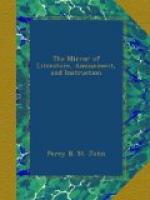[2] All places in the neighbourhood of Alderley Edge and Mobberley.
* * * * *
ANTIQUARIAN SCRAPS.
(To the Editor.)
I went the other day over the ruins of St. Dunstan’s, and whilst gaping about, saw over one of the portals (inside) an old harp, with an inscription, which, as far as I could make it out, ran thus:—
St. Dunstan’s harp against a wall,
Upon a pin did hang’a,
The harp itself, with ly’ and all,
Untouched by hand did twang’a.
The harp was supposed to play by itself on St. Dunstan’s Day: ly’ means lyre.
Can any of your intelligent correspondents inform me why there is an elder tree in all the Palace Gardens?
There is at the back of Old London Bridge, on this side, a street called “Labour in Vain Hill:” not from the height, but from a stone, on which are engraved two figures washing a blackamoor.
GEO. ST. CLAIR.
Dean-street, Soho.
* * * * *
I do not know where your indefatigable correspondent Zanga discovered his curious “Historical Fact,” detailed in No. 471 of The Mirror: it is highly amusing, but unfortunately void of truth. The wife of the first Earl of Clarendon was Frances, daughter of Sir Thomas Aylesbury, Bart. (now extinct) one of the Masters of Request; by whom he had issue four sons—viz. Henry, his successor; Lawrence, created Earl of Rochester; Edward, who died unmarried; and James, who was drowned while going to Scotland in the Gloucester frigate: also two daughters—viz. Ann, wife of James, Duke of York, afterwards James II., and Frances, married to Thomas Knightly, created a Knight of the Bath.
HENRY CARR.
* * * * *
SELECT BIOGRAPHY.
* * * * *
MEMOIR OF TAM O’SHANTER.
(For the Mirror.)
Thomas Reid, so celebrated as Tam O’Shanter by Burns, was born in the Kyle of Ayrshire. His first entrance into active life was in the capacity of ploughboy to William Burns, the father of the poet, whom Thomas described as a man of great capacity, as being very fond of an argument, of rigid morals, and a strict disciplinarian—so much so, that when the labours of the day were over, the whole family sat down by the blazing “ha’ ingle,” and upon no pretence whatever could any of the inmates leave the house after night. This was a circumstance that was not altogether to Thomas’s liking. He had heard other ploughboys with rapture recount scenes of rustic jollity, which had fallen in their way, while out on nocturnal visits to the fair daughters or servant girls of the neighbouring farmers—scenes of which he was practically ignorant. And more—he had become acquainted with a young woman he had met at Maybole Fair; and having promised to call upon her at her father’s house, owing to his master’s regularity of housekeeping, he had found it totally impracticable.




